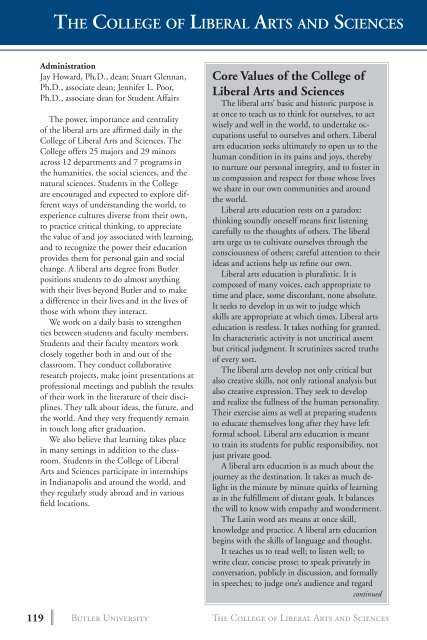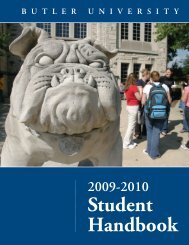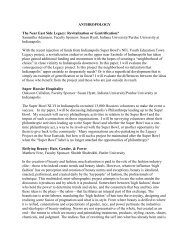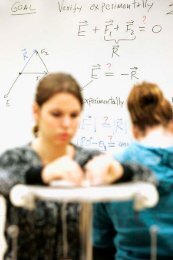2 0 1 3 bulletin - Butler University
2 0 1 3 bulletin - Butler University
2 0 1 3 bulletin - Butler University
You also want an ePaper? Increase the reach of your titles
YUMPU automatically turns print PDFs into web optimized ePapers that Google loves.
The College of Liberal Arts and Sciences<br />
Administration<br />
Jay Howard, Ph.D., dean; Stuart Glennan,<br />
Ph.D., associate dean; Jennifer L. Poor,<br />
Ph.D., associate dean for Student Affairs<br />
The power, importance and centrality<br />
of the liberal arts are affirmed daily in the<br />
College of Liberal Arts and Sciences. The<br />
College offers 25 majors and 29 minors<br />
across 12 departments and 7 programs in<br />
the humanities, the social sciences, and the<br />
natural sciences. Students in the College<br />
are encouraged and expected to explore different<br />
ways of understanding the world, to<br />
experience cultures diverse from their own,<br />
to practice critical thinking, to appreciate<br />
the value of and joy associated with learning,<br />
and to recognize the power their education<br />
provides them for personal gain and social<br />
change. A liberal arts degree from <strong>Butler</strong><br />
positions students to do almost anything<br />
with their lives beyond <strong>Butler</strong> and to make<br />
a difference in their lives and in the lives of<br />
those with whom they interact.<br />
We work on a daily basis to strengthen<br />
ties between students and faculty members.<br />
Students and their faculty mentors work<br />
closely together both in and out of the<br />
classroom. They conduct collaborative<br />
research projects, make joint presentations at<br />
professional meetings and publish the results<br />
of their work in the literature of their disciplines.<br />
They talk about ideas, the future, and<br />
the world. And they very frequently remain<br />
in touch long after graduation.<br />
We also believe that learning takes place<br />
in many settings in addition to the classroom.<br />
Students in the College of Liberal<br />
Arts and Sciences participate in internships<br />
in Indianapolis and around the world, and<br />
they regularly study abroad and in various<br />
field locations.<br />
Core Values of the College of<br />
Liberal Arts and Sciences<br />
The liberal arts’ basic and historic purpose is<br />
at once to teach us to think for ourselves, to act<br />
wisely and well in the world, to undertake occupations<br />
useful to ourselves and others. Liberal<br />
arts education seeks ultimately to open us to the<br />
human condition in its pains and joys, thereby<br />
to nurture our personal integrity, and to foster in<br />
us compassion and respect for those whose lives<br />
we share in our own communities and around<br />
the world.<br />
Liberal arts education rests on a paradox:<br />
thinking soundly oneself means first listening<br />
carefully to the thoughts of others. The liberal<br />
arts urge us to cultivate ourselves through the<br />
consciousness of others; careful attention to their<br />
ideas and actions help us refine our own.<br />
Liberal arts education is pluralistic. It is<br />
composed of many voices, each appropriate to<br />
time and place, some discordant, none absolute.<br />
It seeks to develop in us wit to judge which<br />
skills are appropriate at which times. Liberal arts<br />
education is restless. It takes nothing for granted.<br />
Its characteristic activity is not uncritical assent<br />
but critical judgment. It scrutinizes sacred truths<br />
of every sort.<br />
The liberal arts develop not only critical but<br />
also creative skills, not only rational analysis but<br />
also creative expression. They seek to develop<br />
and realize the fullness of the human personality.<br />
Their exercise aims as well at preparing students<br />
to educate themselves long after they have left<br />
formal school. Liberal arts education is meant<br />
to train its students for public responsibility, not<br />
just private good.<br />
A liberal arts education is as much about the<br />
journey as the destination. It takes as much delight<br />
in the minute by minute quirks of learning<br />
as in the fulfillment of distant goals. It balances<br />
the will to know with empathy and wonderment.<br />
The Latin word ars means at once skill,<br />
knowledge and practice. A liberal arts education<br />
begins with the skills of language and thought.<br />
It teaches us to read well; to listen well; to<br />
write clear, concise prose; to speak privately in<br />
conversation, publicly in discussion, and formally<br />
in speeches; to judge one’s audience and regard<br />
continued<br />
119 <strong>Butler</strong> <strong>University</strong><br />
The College of Liberal Arts and Sciences
















